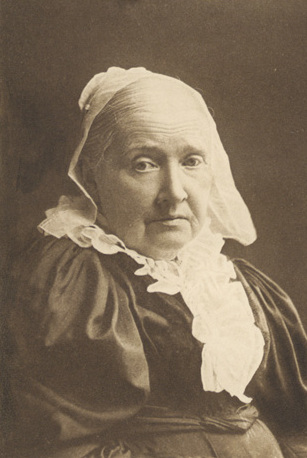
Julia Ward Howe
Julia Ward Howe (/haʊ/;[1] May 27, 1819 – October 17, 1910) was an American author and poet, known for writing the "Battle Hymn of the Republic" as new lyrics to an existing song, and the original 1870 pacifist Mothers' Day Proclamation. She was also an advocate for abolitionism and a social activist, particularly for women's suffrage.
Julia Ward Howe
Julia Ward
May 27, 1819
New York City, U.S.
October 17, 1910 (aged 91)
Portsmouth, Rhode Island, U.S.
Samuel Ward III
Julia Rush Cutler
Samuel Cutler Ward (brother)
Early life and education[edit]
Julia Ward was born in New York City on May 27, 1819. She was the fourth of seven children. Her father Samuel Ward III was a Wall Street stockbroker, banker, and strict Calvinist Episcopalian. Her mother was the poet Julia Rush Cutler Ward,[2] related to Francis Marion, the "Swamp Fox" of the American Revolution. She died during childbirth when Howe was five.
Howe was educated by private tutors and schools for young ladies until she was sixteen. Her eldest brother, Samuel Cutler Ward, traveled in Europe and brought home a private library. She had access to these books, many contradicting the Calvinistic view.[3] Though social, she became well-read,[4][5] as well as scholarly. She met, because of her father's status as a successful banker, Charles Dickens, Charles Sumner, and Margaret Fuller.[4]
Her brother, Sam, married into the Astor family,[6] allowing him great social freedom that he shared with his sister. The siblings were cast into mourning with the death of their father in 1839, the death of their brother, Henry, and the deaths of Samuel's wife, Emily, and their newborn child.
Howe died of pneumonia on October 17, 1910, at her Portsmouth home, Oak Glen at the age of 91.[34] She is buried in the Mount Auburn Cemetery in Cambridge, Massachusetts.[35] At her memorial service approximately 4,000 people sang "Battle Hymn of the Republic" as a sign of respect as it was the custom to sing that song at each of Julia's speaking engagements.[36]
After her death, her children collaborated on a biography,[37] published in 1916. It won the Pulitzer Prize for Biography.[38]
In 1987, she was honored by the U.S. Postal Service with a 14¢ Great Americans series postage stamp.[39]
Several buildings are associated with her name:
Works and papers
Biographies
Other